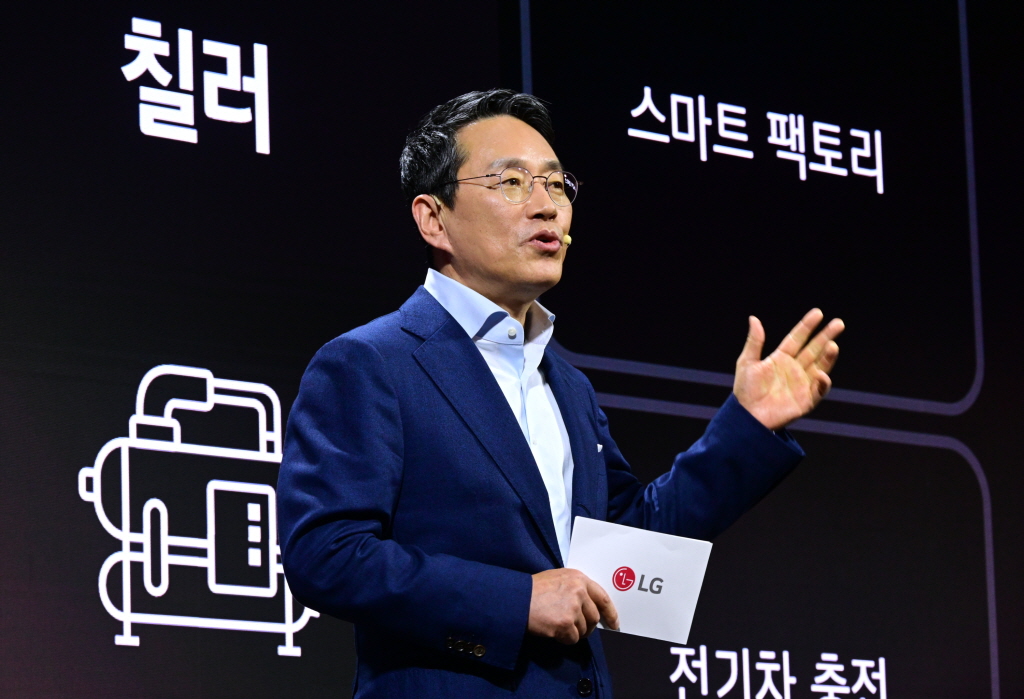LG전자는 21일 마곡 LG사이언스파크에 국내외 기관투자자 및 증권사 애널리스트를 초청해 ‘인베스터 포럼’을 열었다. 조주완 CEO가 나서 2030 미래비전 발표 이후 1년여간 추진해 온 사업 포트폴리오 혁신의 경과와 방향을 소개했다. 조주완 CEO 외에도 김창태 CFO(최고재무책임자, 부사장), 이삼수 CSO(최고전략책임자, 부사장) 등 최고경영진과 HVAC(냉난방공조), webOS 콘텐츠/서비스, 구독 등 주요 사업 육성을 책임지는 담당 임원이 참석했다.

▲LG전자 인베스터포럼(Investor Forum)에서 LG전자 조주완 CEO가 사업 포트폴리오 혁신전략에 대해서 설명하고 있다.
인베스터 포럼, 포트폴리오 혁신 경과·방향성 소개
AI 로봇·전기차 충전 등 미래성장 신사업 투자 지속
LG전자가 AI 기반 로봇, 전기차 충전 등 미래 성장의 기반이 되는 유망 신사업 분야 투자를 지속하고, 칠러 사업을 앞세워 AI 데이터센터 냉각 시장 공략에 본격 나선다.
LG전자는 21일 마곡 LG사이언스파크에 국내외 기관투자자 및 증권사 애널리스트를 초청해 ‘인베스터 포럼’을 열었다.
조주완 CEO가 나서 2030 미래비전 발표 이후 1년여간 추진해 온 사업 포트폴리오 혁신의 경과와 방향을 소개했다. 조주완 CEO 외에도 김창태 CFO(최고재무책임자, 부사장), 이삼수 CSO(최고전략책임자, 부사장) 등 최고경영진과 HVAC(냉난방공조), webOS 콘텐츠/서비스, 구독 등 주요 사업 육성을 책임지는 담당 임원이 참석했다.
LG전자는 행사 서두에 2030 미래비전의 재무적 목표의 중간 진척상황을 공유했다. 올 상반기 경영실적(LG이노텍 제외)을 기준으로 전년동기대비 매출 성장률은 8%, 영업이익률은 6%, EV/EBITDA 멀티플은 4배 수준이다.
조주완 CEO는 “지난 1년여간 미래비전 달성의 기반을 착실하게 다져 오는 가운데, 다양한 영역에서 ‘구조적 변화’와 ‘지속가능한 성과’를 만들어 가고 있다고 자부한다”며 “강한 자신감과 책임의식을 가지고 목표 달성을 위해 일관성 있고 강력한 전진을 지속해 나갈 것”이라고 강조했다.
LG전자는 △기존사업의 성장 극대화 △플랫폼 기반 서비스 사업 △B2B 가속화 △신사업 육성 등의 전략 방향 아래 포트폴리오 혁신을 추진하고 있다.
먼저 기존사업의 성장 극대화는 가전, TV 등 성숙단계에 접어든 주력사업의 한계를 돌파하고 잠재력을 극대화하는 시도다. 일회성 판매에 그치던 가전 사업에 서비스를 결합해 구독 사업을 펼치는 것이나 D2C(소비자직접판매) 확대로 고객 선택 폭을 넓히고 차별화된 경험을 제공하는 것이 대표적이다.
B2B 가속화의 경우 디지털화, 전기화 등 시장 변곡점과 연계해 자동차부품, 냉난방공조(HVAC), 스마트팩토리 등 분야에서 성과를 내고 있다. LG전자는 오는 2030년까지 전체 매출에서 B2B 비중을 45% 수준까지 늘린다는 계획이다. 지난 2021년 27% 수준이던 B2B 비중은 올 상반기 35%까지 올라갔다.
전장 사업은 수주잔고 100조원 이상을 확보했다. 디지털 콕핏 등 고부가가치 제품의 판매가 늘어나고 있으며 사업 확장을 위한 글로벌 생산지 투자도 활발하다. 냉난방공조 사업은 인버터, 히트펌프 등 기술력을 앞세워 고효율, 친환경 시장을 주도하는 한편, 최근 AI 데이터센터 수요 폭증에 칠러 등 냉각시스템 시장을 적극 공략하며 고속 성장을 추진해 나간다. 최근 본격화한 스마트팩토리 사업은 60여년의 제조 노하우에 AI, 로봇 등을 접목, 그간 LG그룹 내 다양한 산업군에서 검증된 역량을 기반으로 사업을 확대한다. 올해 말 기준 수주액은 2,500억원 이상 달성을 예상하고 있다.
미래성장의 기반이 될 유망 신사업 영역 투자도 지속한다. 상업용 로봇은 AI 기반 소프트웨어 중심 로봇(SDR: Software Defined Robotics) 역량 확보, 전기차 충전사업은 글로벌 유력 파트너와 협업해 사업기회 확보에 매진한다.
LG전자는 가전에 서비스를 결합한 구독 사업으로 가전 사업의 패러다임 전환을 주도하고 있다. 판매 시점에 일회성 매출과 수익이 발생하는 제품 중심 사업과는 달리 판매 이후에도 제품에 최적화된 케어서비스 등을 제공하며 고객과 관계를 유지하고 지속적인 수익을 창출하는 방식으로의 변화다.
구독 사업은 지난해 연매출 1조1,341억원으로 유니콘 사업 반열에 올랐다. 직전년도 대비 33% 성장한 수치다. 올 들어서는 성장세가 더욱 가파르다. 올해 가전구독 매출은 60% 가까이 올라 1조 8천억 원을 넘어설 전망이다.
webOS 기반 광고/콘텐츠 사업은 전 세계 수억 대 제품을 플랫폼으로 삼아 추가 수익원을 창출하는 모델이다. 올해 매출은 지난 2021년 대비 4배 성장하는 1조 원을 넘길 전망이다. LG전자는 이 사업의 고속 성장을 위해 △모수(母數) 확대 △수익모델 다변화 △사업역량 강화 등에 드라이브를 건다.
LG전자 냉난방공조 사업은 가정용 에어컨부터 빌딩/학교/공공기관 등의 상업용 에어컨, 공장/발전소 등에 들어가는 산업용 공조시스템, 보일러를 대체하는 히팅 영역 등 폭넓은 포트폴리오를 확보하고 있다. 탈탄소, 전기화 등의 시장 변화 흐름을 타고 빠르게 성장하는 핵심 사업 가운데 하나다.
특히 최근에는 AI 열풍에 글로벌 빅테크를 중심으로 데이터센터 구축 수요가 늘어나며 냉각시설로 활용되는 칠러(Chiller) 사업의 기회가 새롭게 열리는 추세다. 칠러는 냉매로 물을 냉각시켜 차가운 바람을 만들고 대형 건물 등에 냉방을 공급하는 설비다. LG전자 칠러 사업의 최근 3년 연평균성장률은 15%를 넘어선다. 같은 기간 해외 매출은 2배 이상으로 늘었다.
LG전자는 발전소, 데이터센터 등 다양한 사양의 칠러를 공급해 온 경험과 냉난방공조 사업의 고효율·고성능 원천기술을 앞세워 데이터센터 냉각 시장을 적극 공략해 나간다는 계획이다. 더불어 지속적인 연구개발을 통해 최근 새롭게 대두되는 액침냉각 등의 신규 솔루션도 상용화를 준비하고 있다.
LG전자는 중·장기 목표인 2030 미래비전 달성을 위해 사업 포트폴리오 혁신을 일관되게 추진해 나간다. 이를 통해 △플랫폼 기반 서비스사업 확대 △B2B 전환 가속화 △신사업 육성 등의 중점 추진 영역에서 오는 2030년 전사 매출의 50%, 영업이익의 75%를 달성하겠다는 계획이다.
조 CEO는 “이미 이러한 목표는 빠르게 현실화되고 있다”며 “높은 성장성과 안정적 수익 확보가 가능한 사업구조로의 변화를 추진하며 LG전자의 가치를 보다 제대로 평가받을 수 있도록 노력해 갈 것”이라고 말했다.
